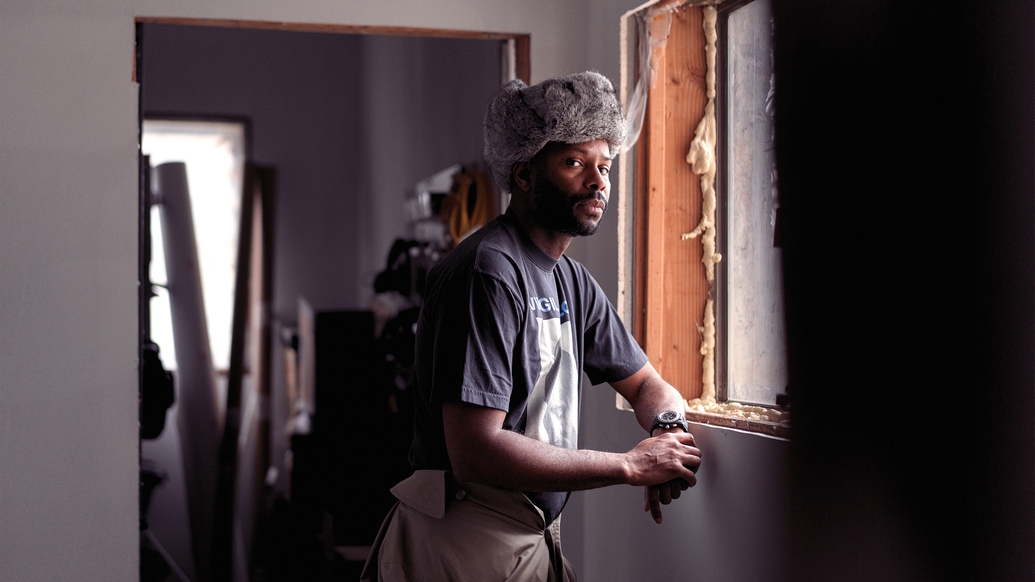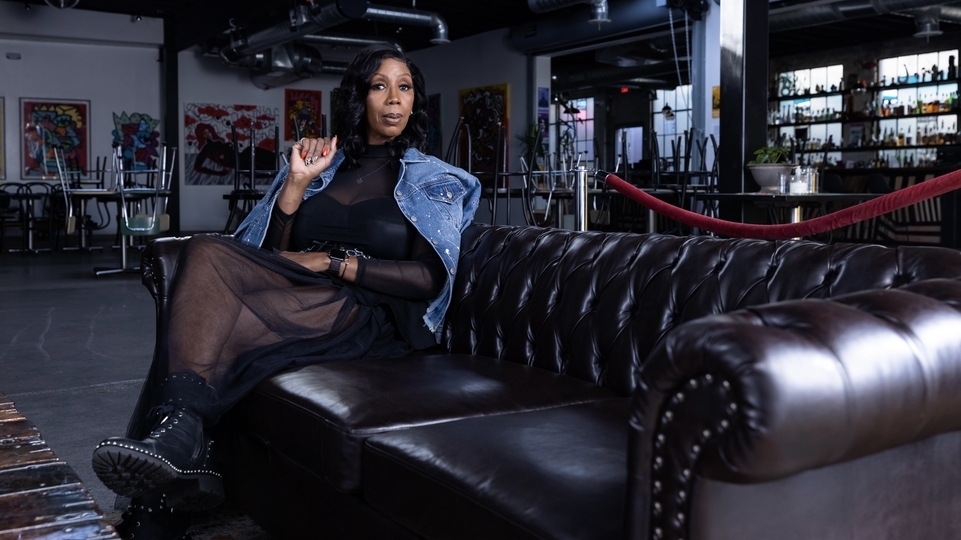
Waajeed: creating from the edge
Coming up in Detroit, Waajeed’s never been afraid to take the necessary steps in order to evolve and thrive as an artist. It’s been a career defined by constant change, pushing against expectations, and seemingly having no fear of what’s next. Bruce Tantum catches up with the veteran Motor City DJ and producer to find out more about his search for musical perfection, the Underground Music Academy, and finding peace in chaos
For Waajeed, it began with a high school talent contest. “I was in ninth or tenth grade, and I was really hellbent on winning,” the DJ and producer, born Robert O’Bryant, recalls. “There was this kid named Earl Hurst in my art class, and he told me that his brother made beats. I immediately said to him, ‘Well, what kind of beats does he make?’ And he says, ‘He makes hip-hop beats.’ And I was like, ‘Well, I’ll walk home with you from school today to hear the kind of beats he’s making’. My thought was for him to produce these beats, for me to produce these three artists — Baatin, T3 and this dude K Black — on top of the beats, and then I would win the talent show. That was the day I met James.”
That’s “James” as in James Dewitt Yancey, as in the late J Dilla, as in one of the most revered beatsmiths to ever emerge from the hip-hop universe; Baatin and T3, like Dilla, were later to become founding members of the seminal Motor City hip-hop outfit Slum Village. “I met James at his house," Waajeed continues, “and I said, ‘I need four beats. And how much would that cost?’ He said, ‘Ten bucks apiece’. I had money because I worked with my father all summer, and I paid him for the beats right there — and he made them right in front of me.”
Waajeed may not have won that contest — “I think Baatin and I got third place,” he says — but it’s one of the transformative moments that have served as guideposts in his serpentine career, one that’s taken him from hip-hop to art school, back to hip-hop and then to Motor City house and techno. It’s among the events that have led to what are perhaps the biggest projects of his life so far — the recent release of a phenomenal album, ‘Memoirs of Hi-Tech Jazz’, and his efforts to launch the Underground Music Academy, an educational hub with goals far beyond simply showing budding producers their way around a piece of gear or a bit of software.
Waajeed is a lifelong resident of Detroit’s East Side, save for time spent in NYC in the ’00s; his formative years were in Detroit’s Conant Gardens. His father had a healthy collection of funk and soul records, something he credits for sparking an interest in music at an early age. “There was such a vast amount of vinyl in our house,” he says. “I remember him smoking weed at night, listening to jazz records or Parliament-Funkadelic, and I used to sneak out from my room and sit behind him, and just listening along with him until I fell asleep.”

"We saw Amp Fiddler. We saw him coming off that tour bus. We saw how fresh his clothes were, and how different he was, and it was kind of like, ‘Well, you know what, let me try it. Let’s see where this takes us’. And it changed my life.”
Other family members contributed to his learning curve as well. “My uncle Walter was going to college in Lansing, and he would come home with all these really hip and new crazy records that he was listening to, music like the B-52s, or Kraftwerk’s ‘Pocket Calculator’ on 45. My other uncle Mark was really deep into music as well. It was just a natural inclination for me to start thinking about cutting up records.”
But Waajeed’s focus, at that stage of his life, was elsewhere. “I was attracted to anything in terms of creativity,” he says, “but my biggest passion back then was art — visual art, like drawing — and I had a motivation to be like the first in my family to go to college to become an artist.”
He credits one of his teachers, Ross Fowler, as encouraging that dream. “I think it was my ninth or 10th grade in art class. He said to me, ‘You can really do something with this thing’. That was the first time I heard that from an adult. By later that year, I was taking courses at CCS [Center for Creative Studies], where later I ended up going to college for industrial design.”
By then, though, Waajeed’s connection to music had strengthened considerably. He gives much of the credit — for both a career in music and, years later, as an inspiration behind Underground Music Academy — to a pivotal player in the Detroit scene, the producer, musician, vocalist and songwriter Amp Fiddler. Waajeed went to school at Pershing High; Fiddler lived nearby, and the school kids would see him return from his musical travels on a tour bus. ‘We were like, ‘Holy fucking shit, is that a tour bus? In the middle of the hood?’”
Soon, Waajeed and his schoolmates got to know Fiddler, and eventually he began inviting the kids to his basement, where he’d show them the ins and outs of the MPC and other bits of gear. Those visits were another inflection point in Waajeed’s life. "At that point in my life, I had a choice to make,” he says.
“There was a prison two blocks away from my high school, and there were the Sojourner Truth Projects two blocks away, and then Amp’s place was a block away. So the choices are right there in front of you — which one are you going to choose? Are you going to choose that prison? You know where that will land you. Are you going to choose those projects? You know how that goes. Or are you going to try to make beats in this basement? You don’t know how that goes — but if you see it, you can be it, and we saw Amp Fiddler. We saw him coming off that tour bus. We saw how fresh his clothes were, and how different he was, and it was kind of like, ‘Well, you know what, let me try it. Let’s see where this takes us.’ And it changed my life.”

When he was still in his early teens, T3, Baatin and J Dilla had formed Slum Village; Waajeed, who had started putting his father’s records to good use, joined them as the group’s DJ. But when he was 19, armed with a full scholarship to CCS, college took over, with the idea of focusing on industrial design. That scholarship gave him the freedom to experiment and bounce around from class to class. “Painting, jewelry making, a lot of things — and I had a fair amount of love for it all,” he says. “I eventually picked up the camera.”
International success, meanwhile, had come Slum Village’s way. The crew, about to embark on a series of European dates, looked to Waajeed as someone who could smooth out the trio’s intrapersonal relations while on tour. “I had a conversation with Dilla,” Waajeed says. “He and Baatin were at odds since the very beginning, just different personalities. They just didn’t get along. And I was always the person that was the jokester, that kind of kept the laughs rolling, which kind of made them forget about the turmoil. So James said to me, ‘Man, we really need you to come on the road with us.”
Returning to Detroit, Waajeed made the decision to forego college and focus his energy on music. He’d already been producing a bit — for that talent show, for instance, and on demos he’d made with Baatin for a short-lived project called H20 (Hard 2 Oppose) — but now he hunkered down and learned the nuts and bolts of studio work. In 2002, a Waajeed-crafted track, ‘Serious,’ appeared on an EP from Slum Village associate Q. Dee; by 2002, J Dilla had left Slum Village, but by then Waajeed’s production game was strong enough that he was able to contribute a few cuts to the act’s ‘Trinity (Past, Present And Future)’.
Within a few years he had joined forces with the multi-instrumentalist Darnell “Saadiq” Bolde as the progressive hip-hop / R&B outfit Platinum Pied Pipers, releasing two excellent albums on the Ubiquity label. But as Platinum Pied Pipers was taking off, Waajeed got a message that, in retrospect, proved to be another in his series of life-changing events. “My A&R reached out,” Waajeed says, “and said, ‘Roy Davis, Jr. Would like to do a collaboration with you on his album.’”
Davis, of course, was (and is) one of Chicago house music’s defining features — which meant little to Waajeed at the time. “I didn’t know who the fuck this guy was,” he admits. “I didn’t have an understanding of the genre, and I didn’t really have an understanding in terms of his legacy, and what he’s contributed to the genre.”
Still, he took a call with Davis, and they agreed to work together — the resulting short track, ‘String & Things', serves as the intro to Davis’s 2005 LP, ‘Chicago Forever'. Meeting Davis, meanwhile, led Waajeed to rethink his production methodology. “I had always been a self-described gearhead, and when I went in Roy’s basement, he had the keyboards that you fucking dream about,” he explains. “But then we went into this furnace room, and he was using very little equipment down here — just like a keyboard and a computer, and he was using this program, Reason 3.0. I was like, 'oh shit, this is a game changer'. It’s going to make me think about music in another way.”

“For me, it’s the journey, not the result, you know? The experience that I gain while I’m making a thing is more important than the thing. It’s all just part of a grander experience. I mean, I’m just looking for the perfect beat, really.”
A trip to Miami’s Winter Music Conference, where Waajeed met up with Davis and caught his DJ sets, led him to rethink the entire style of music he was making as well. “We showered, shaved and went straight to clubs,” he says. “I’d seen DJs play house tracks in clubs, but I had never seen it from that point of view — behind the booth, looking at the human beings in front of me and watching Roy play these records. To see what the power of dance music in action was something that I had never witnessed before.
"It was a magic that I had never seen concocted before," he continues. "I was like, 'holy fucking shit!' I was just thinking, okay, I need to start figuring this thing out. I’d always thought about producing this type of music, that was the moment when I thought, 'okay, I need to figure out what this formula is. I need to be thinking inside of this space'.”
By 2007, he was making tracks in the mode of house and techno, and sending them off to Davis for feedback. “And he would just be like, ‘Man, this is some bullshit,’ he recounts with a laugh. “Maybe that’s not exactly what he said, but that’s what I took him to mean. I took this as a challenge to not just do this thing, but do it in my way, in a way that was true to my story. Eventually, I decided to start my own label and start releasing this stuff on my own — because why am I looking for some approval when it’s my fucking journey?”
Waajeed’s been on his house and techno journey since the release of Platinum Pied Pipers second and final album, 2009’s ‘Abundance’, making time for the occasional short-duration side trip — like a single EP from his 2013 trip-hoppish project Tiny Hearts, followed by a pair of fractured-R&B releases as Jeedici. “As a Detroiter, I was a person who was always in love with productions by Derrick May and Model 500,” he says. “This story and this legacy is mine. I mean, Detroit did not invent hip-hop.”
“As much hip-hop as I’ve made, It’s not my shit,” he continues. “It’s not my legacy. There are many things that Detroit is a catalyst of — but hip-hop is not one of them; it’s very much a New York thing. That’s not to say that I didn’t have a place in hip-hop, but I didn’t feel like I had ownership of it. But we did make techno, and through all my explorations in sound and music, house and techno was where I’ve always wanted to land.”

Despite all that, Waajeed has little time for genre distinctions. “You know, I never understood what genre was,” he claims. “I remember, early on, asking T3, ‘What is a genre? I don’t fuckin understand this thing’. He explained it, but to me, it felt like it was a tool to keep things separated. It was just something that people who sold music thought about, but it was never something that people who actually made music thought about.
“For me, it’s the journey, not the result, you know? The experience that I gain while I’m making a thing is more important than the thing," he continues. "It’s all just part of a grander experience. I mean, I’m just looking for the perfect beat, really.”
With ‘Memoirs of Hi-Tech Jazz,’ released on Berlin’s Tresor label in November, it feels like Waajeed is inching ever closer to that perfect beat. He began putting together the pieces that would become the album soon after the 2018 release of his ‘From the Dirt’ long-player — and as is the case with much of what he does, it was an all-encompassing effort. “Church ain’t always on Sundays, you know? So I work wherever I can,” he says. “There’s a drum machine in every fucking room in my house — including the toilet."
The work has paid off. The concept of “hi-tech jazz” in relation to Detroit’s house and techno isn’t a new one — Underground Resistance’s Mad Mike Banks used the term as the name of one of his Galaxy to Galaxy project’s releases as far back as 1993 — but Waajeed’s ‘Memoirs of Hi-Tech Jazz,’ is perhaps its fullest realisation to date. Perhaps thanks in part to Waajeed’s genre-agnostic attitude, it’s a fusion of Detroit’s techno and jazz traditions, with the interplay between crisp hi-hat, snare, and occasional bleepy bass of the former underpinning the chords progressions and brass runs of the latter. Thematically, the album runs deep, obliquely dealing with concepts of Black expression, Black struggle and Black joy — though he’s happy to let others find their own meaning.
“I’m not being too literal, because I think art is to be interpreted,” he says. “But I will say that this is probably the most personal album I’ve ever made. It’s a collection of ideas of where I’m at, currently — in life, with the idea of creating Underground Music Academy, everything. It’s reflective of my transitions and my learning curves as a human being. It represents a shift, a new way of thinking, a journey that I want to bring the listener into and through.”

“For me, it’s super important to acknowledge those entities, those ancestors that came before me. And I do believe that by acknowledging them, they give us more power to stand up and face all of these obstacles that are in front of us.”
‘Memoirs of Hi-Tech Jazz’ is, in part, a collaboration between Waajeed and Detroit saxophonist De’Sean Jones, the jazz savant who’s worked with everyone from Underground Resistance to Stevie Wonder. Jones contributed horns (the album brims with quick runs and brass-section harmonies) and string arrangements, adding huge degree of depth to the music.
“De’Sean is one of my favourite youngsters — well, he’s not a youngster, but he’s one of my favourite people who’s coming up in the city,” Waajeed says of the Grammy-nominated artist. “I’ve met his kind of personality before, I’ve had friends who share the same traits as De’Sean has. He’s intense, but he’s focused, you know what I mean? He’s not a dude who’s watching basketball — during the weekend, he’s doing scales. I love this type of person, and when I met De’Sean, I recognised the power of his music, because his passion and his understanding towards music has been redirected towards creating notes instead of chaos.”
The process between Waajeed and Jones started when Jones asked a simple question: “Do you have anything that you want me to play on?” Waajeed did, and sent him a folder containing dozens of tracks, some of them near-finished works and some of them mere sketches “And then, a couple of days later, I got the folder back with him playing sax, EWIs [electronic wind instruments], flutes, whatever, on these tracks,” he recalls. “I was like, ‘Oh, shit!’ Not only did he take the challenge, but he added on to the conversation. I took all of those parts, and I chopped them up and rearranged them, so much so that when De’Sean heard these songs back, he didn’t even recognise his own playing.”
Like a lot of Waajeed’s output, the album feels like a conversation with Detroit’s rich musical heritage. For him, the influence of his predecessors — not just from the techno and house world, but the city’s full spectrum of music — is inescapable. “I don’t exist in a vacuum,” he says. “Nobody does. The place that I come from, and the privilege that I have to stand in this place, is not a result of my own work. I’m very clear that there has been a price that has been paid, that I have not paid.
“Somebody paid that debt for me — not just in music, but in life,” he continues. “For me, it’s super important to acknowledge those entities, those ancestors that came before me. And I do believe that by acknowledging them, they give us more power to stand up and face all of these obstacles that are in front of us.”

Despite his seemingly relentless focus on making music (and despite a looming tour of the US, Europe and Asia on the way, details of which were being worked out as of press time), one gets the feeling that much of Waajeed’s current attention is centered elsewhere — specifically, the Underground Music Academy. The plans for UMA were first shared mid-pandemic, in autumn of 2020 — but the idea for a Detroit-based institution that would impart both studio know-how and music-business smarts has been gestating for far longer, since the days of Amp Fiddler’s basement.
“You just couldn’t come down to Amp’s basement with some bullshit,” Waajeed says. “You had to be studious, and you had to show progress in order for him to take the time out of his day. I mean, he’d let you use his drum machine for hours at a time. Underground Music Academy is very much a product of that — because what Amp did was, he lifted us. He was like, ‘You show up, and I’m gonna give you a shot. I’m gonna give you the space and time, and I’m not gonna hover over you, but I’ll help you figure it out.’”
Waajeed is the face and director of UMA, but needless to say, there are many others involved in the effort. For instance, there’s Mike Banks, who Waajeed describes as “a master strategist”, who’s been instrumental in securing the Academy’s building and getting it into shape. As it happens, the building itself has a bit of history to it — it once served as a NAACP headquarters.
Underground Resistance’s headquarters, along with the Exhibit 3000 techno museum, is right down the street; a bit further, there’s the Motown Museum (“Home of Hitsville U.S.A.”). Kenny Dixon’s beloved Prince homage of a home is nearby as well. “So yeah, there’s some irony — past present future, all in one place,” Waajeed says.
The pandemic slowed down UMA’s progress — it finally held its first in-person classes this past summer — but its deliberately-paced take-off hasn’t lessened Waajeed’s goals for the Academy. “To teach a person how to use a drum machine is important,” he explains, “but we’re dealing with bigger principles and bigger conversations that are greater than just how to use a drum machine. It’s about perseverance — not a question of getting knocked down, but of how quickly do you get back up? And social justice values are being built inside of the curriculum. We’re building that curriculum while finishing a building.”
Underground Music Academy, much like his music, is a way for Waajeed to give love back to the city he loves. In a 2005 interview with Red Bull Music Academy, he described Detroit as “beautiful ugly”, a vibe which helped to mould him into the person he is today. “‘Beautiful ugly’ kind of sums it up,” he says. “Creativity that can come out of that comes out of hardship, basically. I mean, this city almost took me out, man. I have these conversations all the time, like when I see somebody that I came up with in high school, and they’ll say, ‘Man we made it!’ And I’ll be like, ‘Well, that’s to be determined!’
“But that level of passion, and that level of creating from the edge, is part of what you’re listening to when you hear my music. You’re listening to a person who wants to survive, you know, and you’re listening to a person that wants to create."

Creation often involves a willingness to adapt and evolve, which has been one of the overall hallmarks of his career. “I’m not a person that lives their lives based on routine,” he says with conviction. “I’m committed to change and to betterment. When I stepped away from hip-hop, and I stepped into the space of dance music, it was a result of me changing my mind. The space that hip-hop comes from is generally a space that’s built on competition,” he affirms. “It’s a space that’s built on rivalry. It’s the manifestation of our colonisers. And when I decided to step into a space of community and love, like that Roy showed me on those dance floors in Miami, that’s the space where I’m at.”
Waajeed’s been in the game for decades now, and is at the point of his career when many artists might start to think about coasting along to the finish line. That, needless to say, is not his style. “Man, I’m not bored yet,” he says, seemingly shocked by the mere thought of slowing down. “I’m just starting. The music that I’m making right now, that might come out five or 10 years from now — it’s unrecognisable music, and I’m excited about that. The music is a reflection of how I feel about my life, and the places that I’m willing to step into.”
He pauses for a moment to consider those places — the sounds he’s explored, the projects he’s taken on, and his career’s snaking twists and turns. “It’s about the desire to make myself uncomfortable for a greater purpose.”
In 2019, the hip-hop artist and activist Common — born in Chicago, he, like Waajeed, was also forged by the urban Midwest — penned a book titled Let Love Have the Last Word: A Memoir. "It had this quote about revolutionary practices,” Waajeed says. “I’m paraphrasing, but he basically said that finding one’s peace is one of the biggest ways that you can be revolutionary — finding your peace in chaos, and finding answers within yourself, amongst everybody else’s confusion.”
Like anybody, Waajeed’s likely got a ways to go before he gets there — but it’s a safe bet that he’s closer to finding those answers than most of us.





